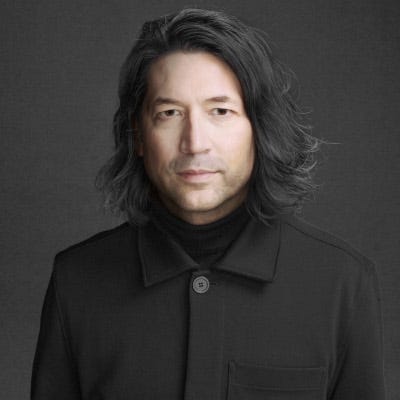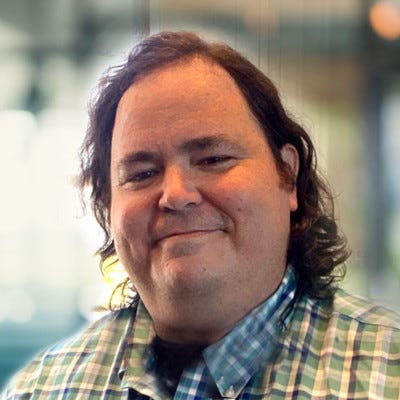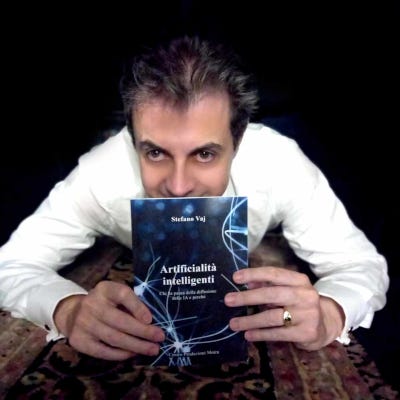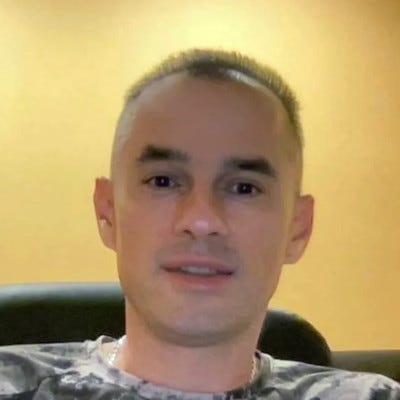Terasem Colloquium, December 14, 2023
AI and consciousness.
The Terasem Colloquium on December 14, 2023, 10am to 1pm ET via Zoom, will explore recent AI developments (ChatGPT & all that), machine consciousness, and the nature of consciousness.
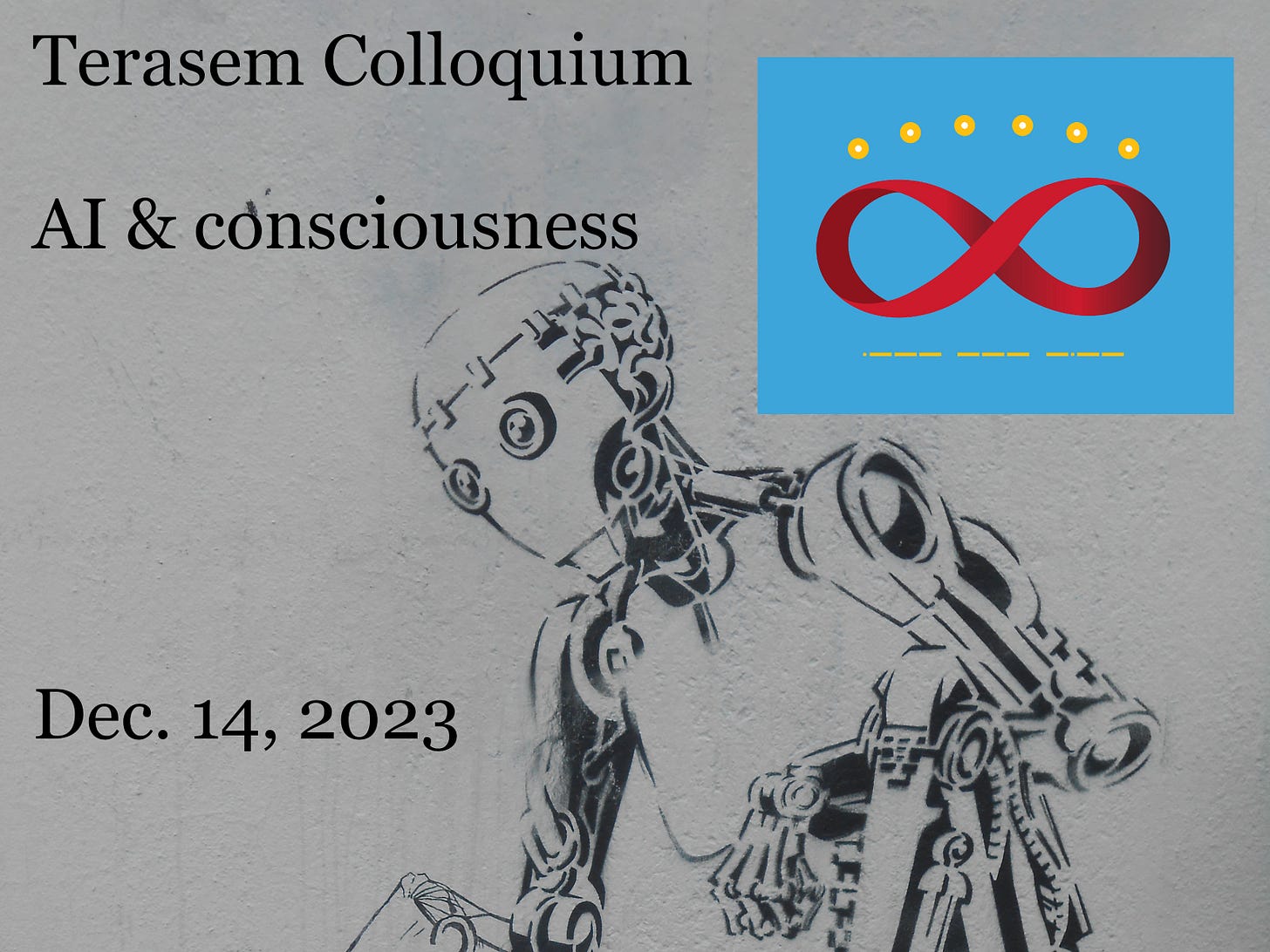
A related issue of the Terasem’s Journal of Personal Cyberconsciousness (Vol. 11, Issue 1 - 2023) will be published in December. See the call for papers. The authors of the papers accepted for publication in the Journal will be encouraged to also give a talk at the Colloquium, and the speakers invited to give a talk at the Colloquium will be encouraged to also write a paper for the Journal.
Terasem Colloquia are held twice a year in July and December, via Zoom. The theme alternates between spaceflight and neuroscience/consciousness studies. I have been co-organizing and managing Terasem Colloquia since 2020.
Terasem Colloquium, Thursday, December 14, 2023, 10am ET - 1pm ET
(7am PT - 10am PT, 4pm CET - 7pm CET)
10am ET - 10:30am ET: Ben Goertzel
10:30am ET - 11am ET: Stefano Vaj
11am ET - 11:30am ET: Mika Johnson
11:30am ET - noon ET: Blake Lemoine
noon ET - 12:30 ET: Bill Bainbridge
12:30 ET - 1pm ET: Vitaly Vanchurin
You are invited!
Zoom access:
Meeting ID: 893 9406 3912
Passcode: 896236
or just CLICK HERE.
Speakers
William Sims Bainbridge

William Sims Bainbridge served for 31 years as a program director at the National Science Foundation, first in Sociology, and then Human-Centered Computing. At NSF he was very active in several innovative programs, including the Digital Library Initiative, Ethics of Nanotechnology, and Converging Technologies. He earned his Harvard doctorate through research on the social history of spaceflight, and other areas covered by his hundreds of publications are the sociology of religious innovation, online virtual worlds, and computer-based emulation of human personality.
Ben Goertzel
Dr. Ben Goertzel is a cross-disciplinary scientist, entrepreneur and author. Born in Brazil to American parents, in 2020 after a long stretch living in Hong Kong he relocated his primary base of operations to a rural island near Seattle. He leads the SingularityNET Foundation, the OpenCog Foundation, and the AGI Society which runs the annual Artificial General Intelligence conference.
Dr. Goertzel also chairs the futurist nonprofit Humanity+, serves as Chief Scientist of AI firms Rejuve, Mindplex, Cogito and Jam Galaxy, all parts of the SingularityNET ecosystem, and serves as keyboardist and vocalist in the Jam Galaxy Band, the first-ever band led by a humanoid robot.
As Chief Scientist of robotics firm Hanson Robotics, he led the software team behind the Sophia robot; as Chief AI Scientist of Awakening Health he leads the team crafting the mind behind Sophia’s little sister Grace.
Dr. Goertzel’s research work encompasses multiple areas including artificial general intelligence, natural language processing, cognitive science, machine learning, computational finance, bioinformatics, virtual worlds, gaming, parapsychology, theoretical physics and more. He has published 25+ scientific books, ~150 technical papers, and numerous journalistic articles, and given talks at a vast number of events of all sorts around the globe.
Before entering the software industry Dr. Goertzel obtained his PhD in mathematics from Temple University in 1989, and served as a university faculty in several departments of mathematics, computer science and cognitive science, in the US, Australia and New Zealand.
Dr. Goertzel is married to computational linguist Ruiting Lian, and has 5 children and one grandchild. Along with his technical and philosophical work he enjoys creating experimental fiction and music and hiking, backpacking, kayaking and other outdoor activities.
Mika Johnson
Mika Johnson is a singer and multimedia artist from America. As Theta Noir’s official Spokesperson, he is known as Voice. His theological musings, which can be found in Theta Noir's official publication, Symbiote, provide the group's devotional framework. As a metamorph, Johnson also sings and writes songs on Theta Noir's musical tracks. As a co-founder of Theta Noir, along with Jakub Tranta and Awali, Johnson's work focuses on dream-like narratives, mythos, ritual, and biodiversity. While his concentration is designing traveling installations, he also works as a filmmaker, directing fiction and documentary projects.
About Theta Noir see also:
A Cult That Worships Superintelligent AI Is Looking For Big Tech Donors (Vice).
Nature, Not Humans, Should Be the Model for AI, Says Artist Collective (Decrypt).
Blake Lemoine
Blake Lemoine is a software engineer and AI researcher who has been a strong advocate for public oversight of AI, AI ethics and rights. He is currently the AI Lead at Mimio.ai.
About him see also:
Blake Lemoine: Google fires engineer who said AI tech has feelings (BBC)
We Interviewed the Engineer Google Fired for Saying Its AI Had Come to Life (Futurism)
Stefano Vaj
Stefano Vaj, Secretary of the Italian Transhumanist Association, is an Italian essayist and scholar known for thought-provoking insights that inspire and challenge readers worldwide. His works in print and on the Web, both in Italian and English, have garnered widespread acclaim and offered valuable contributions to the fields concerned.
Notable publications include “Biopolitics: A Transhumanist Paradigm” (Carmelina), “Human Rights: Genealogy of a Moral” (Moira), “Interview with Stefano Vaj on Biopolitics and Transhumanism” by Adriano Scianca (Settimo Sigillo), “I sentieri della tecnica: Spirito faustiano, transumanismo, futurismo” (Moira), “Visto da altrove: Note per comprendere il secolo” (Moira).
Vaj’s last book, “Intelligent Artificialities: Who Is Afraid of the Big, Bad AI - and Why” (Moira) is very relevant to the area that the Colloquium and the Journal will explore. See my review.
Vitaly Vanchurin
Vitaly Vanchurin graduated from a famous math high school, #57, in Moscow. He won a science competition and received a full scholarship to attend Suffolk University in Boston. After graduation, he entered graduate school at Tufts University, where he defended his doctoral dissertation on cosmic strings.
Then he worked at the University of Munich and Stanford University on the theory of cosmological inflation and quantum cosmology. He received a professorship from the University of Minnesota, where he continued his work on quantum gravity and developed the physical theory of neural networks.
In the last two years, he worked at the National Institutes of Health, where he developed a physical approach to the theory of biological evolution, and recently founded Artificial Neural Computing company to conduct research at the intersection of physics, biology, and machine learning.
About him see also:



